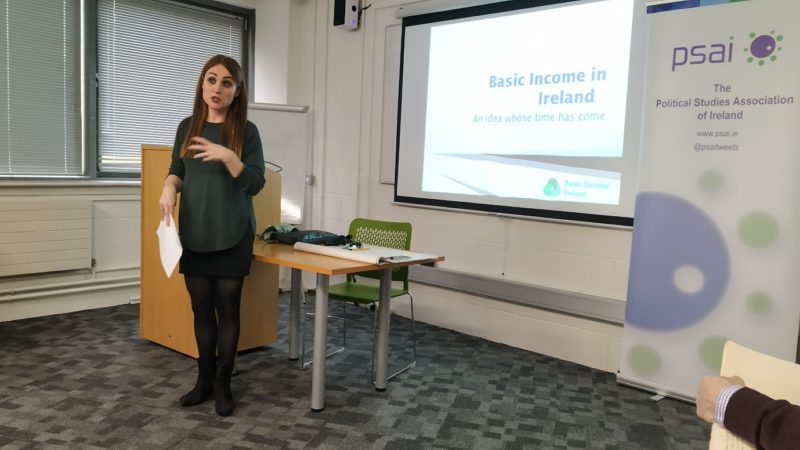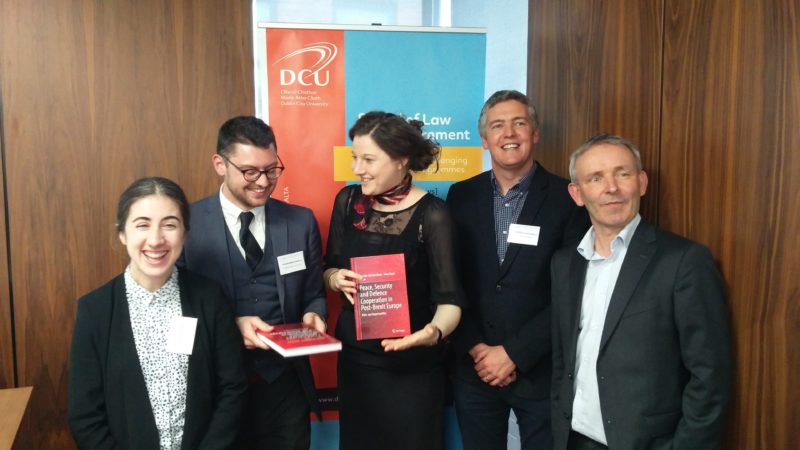CO-EDITOR POSITION OPEN FOR IRISH POLITICAL STUDIES
CO-EDITOR POSITION OPEN FOR IRISH POLITICAL STUDIES
Irish Political Studies (IPS) is still seeking expressions of interest in a co-editor position, tenable for three years from 2021. The PSAI has extended the deadline on this search to 31 January 2021.
A specialist background in the politics of Northern Ireland would be an advantage, while editorial experience and a clear vision for the future of the journal are highly desirable. Interested candidates should send their expression of interest, a short CV and a statement on their editorial vision to Dr. Marisa McGlinchey at ab3628@coventry.ac.uk by the new deadline of 31 January 2021. We particularly encourage female applicants. The decision will be made by an appointment sub-committee of the PSAI Executive Committee.
IPS, the journal of the PSAI, was established in 1986. It is the only refereed journal exclusively dedicated to the publication of high-quality academic articles on Irish politics. It covers politics in the Republic of Ireland and in Northern Ireland, as well as the politics of their bilateral relationship and the politics of their relationships with the United Kingdom, the European Union, and beyond.
Wanted-PSAI Blog Manager
Wanted-PSAI Blog Manager
The Political Studies Association Ireland are looking for an enthusiastic person (or persons) who would agree to curate the PSAI Blog-“Irish Politics Forum-a PSAI blog for the discussion of politics, policy and political reform”. The blog curator would be co-opted onto the PSAI Executive Committee, and otherwise supported by the PSAI.
The blog, a simple WordPress account, has been in operation since 2011 and is linked to the PSAI’s Twitter accounts. The subject matter of the blog is very open. It can include all subjects under the broadest possible definition of political studies and political science-the topics do not have to be about Irish politics narrowly defined.
Posts include long opinion pieces, book review type submissions, quick commentaries on contemporaneous events, reports of conferences or events, awards and activities of interest.
What is required is the commissioning of short pieces-300 to 500 words from academics, post graduates and suitably interested persons. Some editorial skills are required to ensure the quality and probity of content meets the high standards of the PSAI but extensive re-writing of submissions is not required or expected. The successful blog manager(s) should ensure suitable imagery is available to link with each post and ideally the aim would be to have about one blog post a week.
The PSAI would welcome creative suggestions for how the blog could be refreshed and renewed. Have a look at the blog at: https://politicalreform.ie/
And please contact Dr. Diarmuid Torney (DCU, PSAI Executive Committee) with your suggestions at diarmuid.torney@dcu.ie
Teaching politics during the pandemic: experiences, opportunities and challenges
Teaching and Learning in Politics Specialist Group
Teaching politics during the pandemic: experiences, opportunities and challenges
Friday 29th January 20201 10am- 12pm online
10am Intro and welcome Chair Dr Clodagh Harris (UCC)
10.10 Broad experiences of online teaching Dr Catherine O’Mahony, Director of CIRTL
10.30 Disciplines Inquiring into Societal Challenges – Inclusive Engagement (TBC)
Discussion
11.10 3 X 5min experiences (Dr T Reidy UCC , A Kavanagh MU, TBC
11.30
Open discussion
11.50 Close and thank you Dr Mary P. Murphy (MU)
‘Basic Income: Possibilities, Practicalities, Controversies’, Nov 29, 2019, 2-5pm, Geary Institute, UCD.

Basic income is one of the most powerful yet also controversial political ideas of recent decades. Having broken out of the realm of political theory, it has taken hold in the public and political imagination as a potential way of reducing inequality and achieving a society in which people are enabled to engage in a whole range of valuable activities outside the labour market. It draws on and translates a number of important principles of the political theory of equality, including universal rights and payments, support for care and relations of interdependency, and the promotion of well-being. At the same time, it has been enthusiastically taken up by some well-known libertarians, including the CEOs of wealthy tech and social media corporations, leading some critics to suggest that basic income might be used as a means of undermining the welfare state and promoting a society in which everything – including health and education – is for sale.
Exploring these and other questions, the PSAI Political Theory specialist group, in conjunction with the Equality Studies Centre, UCD, hosted a three-hour workshop on Basic Income on the 29th of November. The aim was to explore the theory and reality of proposals for a basic income, and its potential role in the creation of a more egalitarian, sustainable social order.
The workshop was delivered by John Baker, member of the specialist group and Prof Emeritus of Equality Studies and UCD; and Anne Ryan, active member and former trustee of Feasta, and former lecturer in the Department of Adult and Community Education at Maynooth University. Together Anne and John are joint coordinators of the national network Basic Income Ireland. The workshop was facilitated by Marie Moran, director of the Equality Studies Centre UCD, and co-convenor of the Political Theory Specialist Group.
The workshop was divided into three presentations, interspersed with lively discussion and feedback from participants.
- Basic Income: An idea whose time has come
In this presentation, Anne explained what basic income is, its appeal, how it might be funded, and its general effects.
- Some Challenges for the Basic Income Movement
In this presentation, John set out some challenges and controversies faced by advocates of basic income, focusing on paid and unpaid work and on the idea of an adequate income.
- The role of basic income in creating ecological and social resilience and sustainability
In this presentation, Anne argued that basic income plays an integral part in establishing a strongly sustainable, satisfying, sane, humane and ecological future.
The workshop was sponsored by the PSAI and the Equality Studies Centre UCD. We are especially grateful to the PSAI for providing a lovely lunch and much needed coffee for participants! And many thanks to John and Anne for helping the PSAI Political Theory Specialist Group put theory into practice for interested members and friends!

PSAI Book Launch
“Peace, Security and Defence Cooperation in Post-Brexit Europe. Risks and Opportunities”, Cornelia-Adriana Baciu and John Doyle, (Eds.) Springer (ISBN 978-3-030-12417-5).
The book highlights the challenges and prospects of European security cooperation and counterfactually assesses the impact of Brexit on strategic aspects of security, peace, defence and foreign policy for both the European Union and the UK. It applies theoretical and methodological approaches from international relations and security studies to analyse the causal mechanisms of security cooperation, and covers topics including the Northern Ireland peace process, cybersecurity and the role of French-German military cooperation. This book is significant because it contributes to a better understanding and management of anticipated challenges and sources of instability in European and international security, associated with the Brexit process. The book entails contributions from internationally known researchers from London School of Economics, Hertie School of Governance in Berlin, European University Institute in Florence and the Institute for European Studies in Brussels, inter alia.